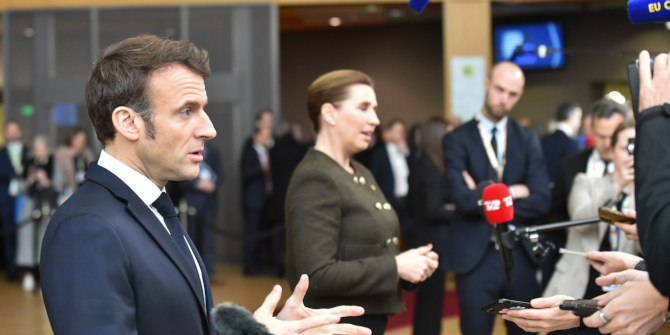 What consequences will Britain’s EU referendum have for both the UK and the rest of Europe? In a series of papers published as a collaboration between EUROPP and CIDOB (the Barcelona Centre for International Affairs), LSE authors analyse the prospects for three scenarios – a Bremain, a ‘soft’ Brexit and a ‘harsh’ Brexit. Swati Dhingra discusses what would happen in the case of a ‘soft’ Brexit, which is defined as the UK exiting the EU without a significant deterioration in relations between Britain and other EU countries. The full papers are available here.
What consequences will Britain’s EU referendum have for both the UK and the rest of Europe? In a series of papers published as a collaboration between EUROPP and CIDOB (the Barcelona Centre for International Affairs), LSE authors analyse the prospects for three scenarios – a Bremain, a ‘soft’ Brexit and a ‘harsh’ Brexit. Swati Dhingra discusses what would happen in the case of a ‘soft’ Brexit, which is defined as the UK exiting the EU without a significant deterioration in relations between Britain and other EU countries. The full papers are available here.
Would leaving the EU make us better off or worse off? The EU is Britain’s largest trading partner, and the economic consequences of Brexit will have wide and complex effects on the British economy. Trade, foreign direct investment, migration and economic regulations would all be affected if Britain exits the EU. So what would be the net impact on British incomes?
The answer depends on what form Britain’s relationship with the EU would take after Brexit. I examine the case of a ‘soft’ Brexit – an exit scenario that does not lead to a trust deficit between Britain and the EU, that does not invoke retaliatory steps to punish Britain economically, and where standard economic analysis can still be used to find out what happens if Britain loses some of its ease in doing business with the EU. Using state-of-the-art economic studies, I discuss the best available forecasts of this soft Brexit on trade and investment in Britain.
According to economic theory, reductions in barriers to trade increase the economic welfare of consumers, businesses and workers. Consumers benefit from reductions in trade costs that reduce the price of imported goods and services. Import competition disciplines domestic sellers, who also reduce the prices they charge to consumers. While domestic sellers lose business due to competition from imports, they get access to new export opportunities that increase their sales and profits. This benefits workers who experience an increase in incomes from expansion of the more productive exporting sector. Workers in import-competing industries lose and need to be compensated. But the main economic insight from trade theories is that all these channels raise efficiency and therefore national income.
Around one half of Britain’s trade is with the EU, about 13 percent of our national income. EU membership reduces trade costs between Britain and the EU. This makes goods and services cheaper for British consumers and allows British businesses to export more. Leaving the EU (‘Brexit’) would lower trade between Britain and the EU because of higher tariff and non-tariff barriers to trade. In addition, Britain would benefit less from future market integration within the EU. The main benefit of leaving the EU would be a lower net contribution to the EU budget.
How does all this add up, and what would be the net consequences of Brexit on living standards in Britain? We have previously developed a structural economic model of trade in 35 sectors among the forty major countries of the world. Using this economic model, they quantify the effects of Brexit on trade and incomes under different scenarios for Brexit. An optimistic scenario is that Britain swiftly strikes a deal that gets it deep access to the EU Single Market, as Norway currently has. In this Norway-style scenario, Brexit would be equivalent to a 1.3 percent fall in average British incomes (or £850 per household), net of the fiscal savings from lower membership contributions. The loss in income arises because Britain-EU trade faces some non-tariff barriers, like rules of origin checks and threats of anti-dumping duties, that apply to Norway too. Britain also misses out on shaping and participating in future reductions in non-tariff barriers that are expected in sectors like services trade which are important for the British economy.
A pessimistic scenario for Brexit is that Britain is unwilling to accept the free movement of labor and the associated regulations that are part of the access price to the Single Market and faces the usual EU external tariffs that are imposed on non-EU members. Trade falls by more in this case because the EU imposes tariffs on British exports and non-tariff barriers rise further due to regulatory divergence. In this pessimistic scenario, Brexit reduces British incomes by 2.5 percent (or £1,700 per household).
How do these counterfactual experiments of the economic model square with a completely data-driven approach? Moving away from a structural economic model, we estimate that leaving the EU and joining the European Free Trade Agreement (EFTA) would reduce British income by 6.3 percent to 9.5 percent. This is because EU member states trade 40 percent more with other EU countries than they do with members of the EFTA, even after controlling for other determinants of bilateral trade such as the size of the two markets and the distance between them. And a 1 percent decline in trade typically reduces income by between 0.5 percent and 0.75 percent. So lower trade due to reduced integration with EU countries would cost the British economy far more than is gained from lower contributions to the EU budget. To put the estimated number in perspective, during the 2008-09 global financial crisis Britain’s GDP fell by around 7 percent.
The data-driven estimates are much higher because they capture both the direct effect of higher trade on income and also other indirect effects of increased proximity between countries such as higher investments or knowledge diffusion. Britain’s ability to easily access EU markets adds to the size of the market available to UK-based investors, making Britain a more attractive destination for foreign direct investment (FDI). If Britain votes to leave the EU, we estimate that Brexit would reduce FDI inflows to Britain by about 22 percent, which would translate into a decline in productivity growth and a loss in British incomes of about 3.4 percent per year.
Brexit will have a sizable impact on British incomes through reduced trade and investments. Reduced integration with EU countries is likely to cost the British economy far more through greater trade barriers than is gained from lower contributions to the EU budget. Some of these losses can be reduced by future trade and investment arrangements with the EU after a soft Brexit. But the possible political or economic benefits of Brexit, such as better regulation, would have to be very large to fully outweigh such losses.
Please read our comments policy before commenting.
Note: This article gives the views of the author, and not the position of EUROPP – European Politics and Policy, nor of the London School of Economics. Featured image credit: Abi Begum (CC-BY-SA-2.0)
Shortened URL for this post: http://bit.ly/1XHqWEL
_________________________________
 Swati Dhingra – LSE
Swati Dhingra – LSE
Swati Dhingra is Assistant Professor in Economics at the Department of Economics and Centre for Economic Performance, London School of Economics and Political Science.





